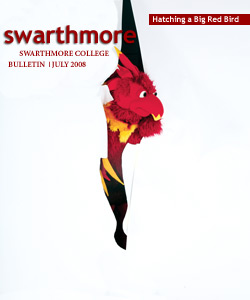Voices that Matter
A Swarthmore radio program enables ordinary Iraqis to speak to the rest of the world.
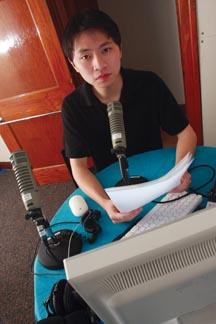
Hansi Lo Wang, senior producer and co-anchor of War News Radio, has been with the program since his first year at Swarthmore.
ONE WINTER MORNING LAST YEAR, Hansi Lo Wang ’09 was conducting a phone interview in Lodge 6, just behind Bond Hall, when he heard something on the other end of the line that shocked him: the tattoo of gunfire, frighteningly close.
“You all right? Are you OK?” Wang asked the person to whom he was speaking, a freelance Iraqi cameraman named Isam Rasheed.
Rasheed, who for a moment seemed slightly shaken, quickly regained his calm, assured Hansi he was fine, and explained that a gun battle had erupted outside his Baghdad home. Then the sound of gunfire was replaced by loud wailing.
“Is someone crying?” Wang asked.
“Yes,” Rasheed replied, “our baby. Six months.”
That exchange, which aired in March 2007, captures the essence of War News Radio (WNR), a Swarthmore radio project whose aim is “to rediscover the voices of real people” in Iraq and Afghanistan. But it also illustrates what the show has brought to the dozens of students who have worked on it: An opportunity to learn firsthand about what the program’s founder, David Gelber ’63, once called “the most serious event in U.S. foreign policy since Vietnam.”
One WNR alumnus, Reuben Heyman-Kantor ’06, now works as a broadcast associate on the international desk at CBS News. “I find the way the United States interacts with the world endlessly fascinating, and there’s no bigger issue, really, for my generation than the war in Iraq; it’s going to be central to how we remember these years,” says Heyman-Kantor, a political science major at Swarthmore. “War News Radio allowed me to interact with that element of who we are in a way I wouldn’t have otherwise.”
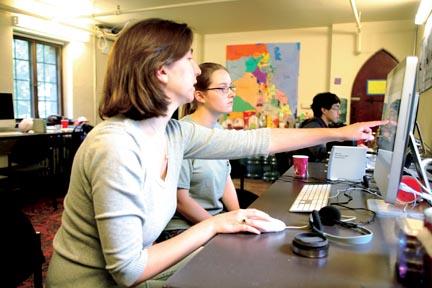
Jess Engebretson ’09 (left), Elizabeth Hipple ’10, and Calvin Ho ’11 work together in the WNR newsroom, preparing for summer programming. War News has broadcast almost every week since early 2005, when the project was suggested by David Gelber ’63.
Broadcast every Friday from campus, the 29-minute program has become a model for Swarthmore students to investigate other issues, including the conflict in Sudan through Darfur Radio Project. Above all, however, War News Radio has shown students that their voices matter. Jess Engebretson ’09, an English major from Great Falls, Va., says that when she came to Swarthmore, she cared about the situation in Iraq and Sudan but didn’t think she was in a position to add much to the discussion. “[WNR] has changed my ideas about what students can do with journalism and what students can contribute to big public debates like the war in Iraq.”
WNR, which Gelber believes is the only project of its kind, emerged from a conviction that the mainstream media had fallen short in its coverage of the war. Since its inception, the show has tried to present the perspectives of ordinary Iraqis—people whose lives have been dramatically changed by the war but who are rarely heard in news reports. “The mission of making Iraqi voices a key part of the discourse on Iraq is a really important one,” says Jesse Gottschalk ’09, a political science major from Charlottesville, Va. “The analyses are not being written by the same people who are being affected, and we want to know what they think.”
Recent studies make clear that this aim remains as relevant as when WNR began in early 2005. During the first 10 months of 2007, only five percent of Iraq coverage was about the daily life of its people, according to the Project for Excellence in Journalism, part of the nonprofit, nonpartisan Pew Research Center. Asked how well they covered various Iraq topics in a Project survey, journalists gave the poorest grades to coverage of the war’s impact on Iraqi citizens.
But the problem isn’t just that a crucial subject has been neglected. In January 2007, 25 percent of newspaper, on-line, television and radio news was devoted to the Iraq War, according to the Project. By February 2008, that figure had plummeted to three percent—and it rose only slightly with the five-year anniversary of the war in March. Not surprisingly, the decline in Iraq coverage corresponded with a big increase in reporting on the hotly contested presidential race.
At the same time that coverage of the war has diminished, fewer Americans are tuning in, according to surveys by the Pew Research Center. “My view is the war is becoming more and more distant for Americans, which I think is discouraging,” says Wang, a political science major. “Ideally, in a democracy you have the citizens and an informed public paying attention to what the government is involved in.”
The public’s growing disinterest in the war presents a challenge for WNR. So far, however, the show continues to attract thousands of listeners every week. It’s heard on more than 50 radio stations from Bologna, Italy, to Barrow, Alaska. People can also listen to WNR broadcasts over the Internet at www.warnewsradio.org or subscribe to the bi-weekly podcast.
Although WNR is financed by the Swarthmore President’s Office and the College’s Lang Center for Civic and Social Responsibility, students make their own journalistic decisions. WNR’s staff reflects the liberal leanings of Swarthmore’s student body, but the show aims to be an unbiased source of news about Iraq. “I like to say our viewpoint is the war is still going on,” Wang says. “Pro-war, anti-war, the war is still going on. We need to understand it better.”
In part to achieve that goal, the WNR staff instituted a format change this semester. Rather than airing reports on a variety of issues, each show is now organized around a single theme, such as oil, local politics, the situation in Afghanistan, and the refugee crisis. During the past several years, the program has explored topics ranging from humor in Iraq to the use of Facebook among U.S. soldiers. An Iraq/Afghanistan 101 segment provides background on a key issue or figure, such as Afghan President Hamid Karzai or the history of de-Baathification. The show’s “A Day in the Life” series has featured interviews with an American soldier struggling with post-traumatic stress disorder, a doctor in Kabul, and an Iraqi blogger.
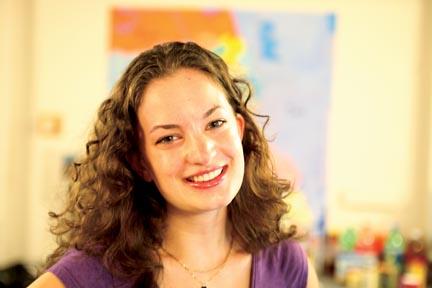
Elizabeth Threlkeld ’09 was recently honored by the Society of Professional Journalists for her story “A Tale of Two Nose Jobs.”
“You can learn so much from talking to people (in Iraq) and finding how their lives have changed, because it speaks to the larger issues facing the country,” says Elizabeth Threlkeld ’09, a sociology/anthropology major from Edmond, Okla. Threlkeld was honored recently with the 2007 Region 1 Mark of Excellence Award from the Society of Professional Journalists. Her “Story of Two Nose Jobs” won first place in the Radio Feature category. “Food Shopping in Baghdad” by Cyrus Stoller ’10 won second place in the same category.
A report by Tevye Kelman ’06 interwove two narratives: that of an Iraqi doctor whose daughter was killed at a U.S. military checkpoint and that of an American soldier who manned one. Both men described the fear and uncertainty they faced at checkpoints. WNR alumnus David Mann ’05 says, “The juxtaposition of those two has always illustrated the conflict for me—and is a powerful example of what we can do with radio.”
WNR had its genesis in another conflict marked by ambiguity: Vietnam. During that war, Pacifica Radio provided a nightly war summary that was “far more informative and comprehensive than anything in the mainstream media,” recalled Gelber, a 60 Minutes producer and a member of the College’s Board of Managers.
Fast forward more than three decades to the war in Iraq, and, at least in one respect, the situation hadn’t changed. “I was frustrated by the quality and quantity of network coverage,” Gelber wrote in an e-mail. “I was pretty sure that students could come up with valuable information and important stories just by getting on the phone and calling pharmacists in Fallujah, hotel clerks in Baghdad, not to mention spokesmen at the Pentagon—and they did.”
But first, they had to learn how to produce a radio show. On a snowy weekend in January 2005, a dozen students worked with Gelber and three other professional journalists—including Paul Fischer, formerly of Pacifica Radio and CBS News—to create a pilot radio program.
Soon students were scouring on-line blogs and directories for English-speaking Iraqis to interview. Although their interviews with sources could occur only by phone, in some ways their professional counterparts in Baghdad had little advantage: Iraq had become so dangerous that western journalists were compelled to rely on Iraqis to do most of their on-the-ground reporting.
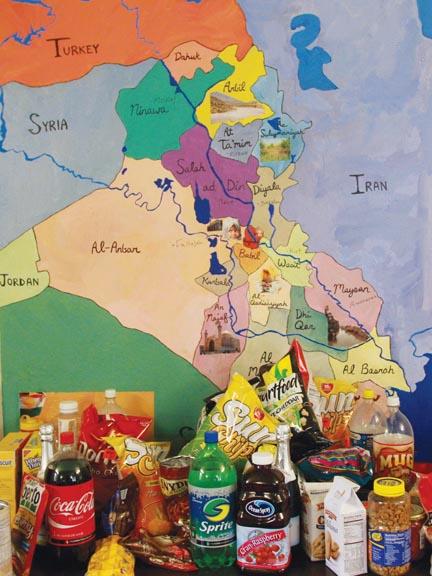
A hand-drawn map on the newsroom wall (above) competes for space with the foodstuffs needed to sustain the staff as it produces a weekly radio show about the wars in Iraq and Afghanistan.
During its first semester, War News Radio operated out of a tiny conference room in Trotter Hall, then shared space with the Swarthmore College Computer Society in Clothier Memorial Hall. In June 2005, it moved to its current home in Lodge 6. Because WNR’s soundproof room had not yet been built, students working on the show that summer sometimes made recordings in people’s cars because it was quieter there.
“The tough memories are good memories,” says Mann, a founding member of WNR and a religion major who is now a lobbyist in Washington, D.C. “We put in so many late nights that the recording track sometimes ended up being mostly laughter.”
After struggling to find the right journalist to work with students, the College hired public radio veteran Marty Goldensohn, who was instrumental in making the program what it is today. During two years with WNR, Goldensohn improved the quality of student journalism and extended WNR’s reach far beyond campus. Dozens of radio stations picked up the show, which garnered wide media attention, including coverage by The New Yorker, The New York Times, The Associated Press, and National Public Radio.
Goldensohn’s successor as journalist-in-residence was Ayub Nuri, an Iraqi who assisted western reporters in Baghdad before leaving in 2006 to earn a master’s degree in journalism from Columbia University. He came to WNR in September 2007 but resigned this spring to return to Iraq. A search for a new journalist-in-residence is under way.
“Having Ayub as a journalist has been like having your own fixer,” says WNR faculty adviser and Professor of History Marjorie Murphy, referring to the Iraqis who translate for western journalists and help them find sources. “We’ve been able, with Ayub, to capture the everyday experience of life in Iraq, which we couldn’t do before.”
Nuri’s contacts in Iraq have been particularly useful since many of the country’s educated, English-speaking citizens have fled. Still, students still face myriad challenges as they try to report on Iraq and Afghanistan from 6,000 miles away. Because it’s nearly half a day later in both countries, students must make phone calls early in the morning or late at night. Sometimes, interviews get cut off because of poor cell phone reception in Iraq, so students have to keep calling back. On-line conversations may be interrupted by power-cuts in Iraq. And students must figure out how to stay on top of their course work while participating in an activity that can consume more than 20 hours per week.
“[There’s the] time crunch of trying to balance life as a student and life as a reporter and knowing that most people just do one or the other,” Engebretson says.
But the two lives also complement each other; students say their experiences at WNR enrich their academic lives and vice versa.
Whether it involves writing a seminar paper on Madame Bovary or solving a mathematical proof, coursework at Swarthmore is largely theoretical. “It’s wonderful to be able to supplement that with something that’s not theory-based in the least,” Threlkeld says. “When you’re able to combine those two elements, you get a much more holistic view.”
Students have earned academic credit for participating in War News Radio by taking a class offered occasionally under the auspices of the College’s Film and Media Studies Program. Students learn the history of the war, Iraq, and the Middle East, then discuss specific events and the media’s response. Finally, they get to work on projects for WNR. Students have also received credit for directed readings on topics related to the history and politics of the region.
Furthermore, WNR helps students acquire skills that they’d be unlikely to get in a traditional Swarthmore course.
“We don’t often push our students to speak to the wider world, to translate their intellectual framework into other ways of seeing and talking,” Swarthmore History Professor Timothy Burke says. “Or if we do, we often do so within a narrow range of understood forms of ‘community learning.’”
Because the students’ stories are heard by people besides professors and peers, the stakes in some respects are higher than in the classroom. “The notion that we’re producing something for an outside audience is a great motivating factor for us,” says Wren Elhai ’08, a political science major from Richmond, Va. “Your voice is on it, your name is on it, and lots of people will listen to it.”
If it hasn’t changed their views on the war, working on WNR has encouraged students to look at the issues in more complex terms.
“A lot of people think they know where they stand when they come in. Then, they ask a few questions and realize it’s more complex than they thought,” Threlkeld says.
Some students come to recognize the potential negative effects—as well as the benefits—of a particular course of action they support, such as a troop withdrawal or an ongoing military presence. Says Gottschalk: “You grow to see that every decision has complications and repercussions far beyond what is narrowly intended by them, and any political judgment is a matter of figuring out the pros and cons as best you can, weighing them, and making a judgment call.”
But even if they’re unsure what America should do in Iraq, students’ involvement in WNR strengthens their awareness of the world outside the so-called “Swarthmore bubble.” Says Wang: “It puts things in perspective. Yes, you have a paper due tomorrow, but the world is still revolving and people are still struggling with their daily lives.”
Engebretson recalls talking to someone in Karbala one morning when the line went dead. She tried calling him back repeatedly on a landline without success. Finally, she tried his cell phone. He didn’t answer. “I was sort of irritated and frustrated, and I had to go to class,” she says.
Later, she received an e-mail from the man—who worked for an Iraqi NGO that focused on peace building—explaining that when she called him on his cell, he couldn’t pick up because he was in a public place. It was simply too dangerous to be heard talking to an American reporter.
“When you have conversations like that, it is very jarring to go back to your privileged life as a student,” Engebretson says.
Two years ago, Amelia Templeton ’06 did a story about two brothers. One wanted to leave Iraq, the other—whom she called Jamal in her report—was determined to stay. But several months later, Jamal changed his mind and decided to leave.
“That’s how I learned firsthand how difficult it was to get out of the country,” even for well-educated, well-connected Iraqis, says Templeton, a history major.
After graduating, she helped Jamal’s family apply for a special immigrant visa. She eventually met the family in Jordan, where she’d traveled as a freelance reporter. Templeton—whose work included a story for public radio’s Marketplace on the lack of access to education for Iraqi refugee children—is now a researcher and lobbyist specializing in Iraqi refugee issues for Human Rights First.
Although WNR has influenced the post-Swarthmore lives of many students, its own future is uncertain. The program receives its primary funding from discretionary money provided by the president’s office. Although declining to give the precise amount, Vice President Maurice Eldridge says, “It is funding that cannot continue indefinitely, and we have been looking for other sources.”
Wang, for one, hopes that WNR continues to thrive as long as it’s needed to help people understand the war. It’s helped him to connect the real world and the classroom world, to take initiative in pursuing knowledge, and to feel part of world events and a sense of responsibility within society.
“What I hoped Swarthmore would be,” he says, “I’ve found at found at War News Radio.”

Sonia Scherr ’01
After graduating from Swarthmore, Sonia Scherr ’01 worked as a reporter for the Valley News, a daily paper based in Lebanon, N.H. She is currently a staff writer for the Intelligence Report, a quarterly magazine published by the Southern Poverty Law Center in Montgomery, Ala. Her most recent article for the Bulletin was about the debate surrounding college rankings. (Photo by Carl Wolf Studios)
 Email This Page
Email This Page